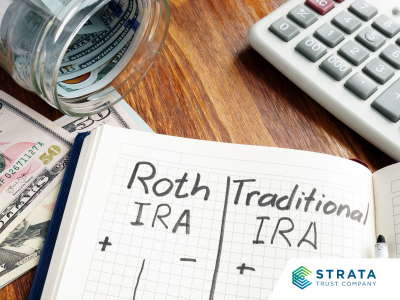A self-directed IRA allows you the freedom to invest your IRA assets in much more than mutual funds, bonds, and ETFs, which are subject to fluctuations in the stock market. And you can control where and how your investment is used and who is managing it.
For example, you could purchase ownership in a local corporation employing many people in your community or in a partnership with a great idea in need of seed money. Your IRA can own a limited liability company that manages multiple investments. And you can buy and sell real estate with your IRA assets. The possibilities are endless for investing to achieve not only financial gain but your personal goals and objectives. But this freedom comes with additional responsibility. If your IRA is invested in a type of investment that can be challenging to value, you will need to provide your IRA custodian with a valuation of the asset each year.
Why are Fair Market Values required?
The IRS requires that all IRA assets be valued annually and at certain other times throughout the year to satisfy the administrative and reporting requirements for IRAs (e.g., Fair Market Value Statement also referred to as FMV). A valuation is also needed to calculate tax liability when an investment is distributed from an IRA. IRAs invested solely in mutual funds, publicly traded stocks, or other investments that are traded daily have a readily available fair market value accessible by your IRA custodian. When it comes to an investment like ownership in a business or real estate, however, expert appraisals are required because assessing value is complex and subject to many variables. As the investor, you are responsible for obtaining the fair market value or good faith estimate of the value of the asset and providing it to your IRA custodian.
Who can provide a valuation update to STRATA?
In most cases, STRATA will receive the FMV directly from the investment issuer, as is the case on most private equity investments. If an investment issuer is unwilling or unable to provide an updated FMV to the IRA custodian on an annual basis, you as the IRA owner are ultimately responsible for obtaining and providing an updated FMV from an independent third party to the IRA custodian.
Accurately providing a value for certain types of alternative investments with no readily ascertainable value, such as private equity, real estate, or business ventures, can be challenging. For real estate, it’s fairly easy since the IRA owner can obtain an updated appraisal or broker’s opinion of the value each year. For other alternative investments, keep in mind that the owner of the IRA cannot determine the FMV of an alternative investment for the purpose of reporting to the IRS. That means, in the absence of an FMV provided by the investment issuer, the owner or the financial advisor will have to obtain the FMV from an independent third party who specializes in appraising alternative assets.
You may engage your own qualified appraiser, or STRATA can provide you with a list of valuation companies which you may use. You may want to contact a few different appraisers to get a full range of options and cost. A valuation as of December 31 of the prior year is needed in early January to complete the first reporting requirement of the year, so it’s important to act fast.
What other events can trigger the need for a valuation update?
STRATA requires valuations be provided annually (as of December 31 each year) and in association with one of these events:
• You take distribution of an asset in-kind (i.e., without liquidating)
• You convert or recharacterize an asset
• There has been a major change in asset value
How and when will STRATA let me know if I need to provide a valuation update?
STRATA will be sending initial valuation update requests on February 1, 2021, to investment sponsors for private equity investment updates and directly to clients who hold real estate within their IRA for real estate updates. For private equity investment updates, we will notify clients directly on *May 3, 2021, if the valuation update has not been received from the investment sponsor.
What else should I know about providing an FMV statement to STRATA?
Valuation updates provided to STRATA should:
• Be compliant with the IRS Revenue Ruling 59-60 approach, method, and factors to consider when determining the value of assets that do not have a readily ascertainable market value
• Be submitted by *June 30, 2021, to avoid further action including late fees and custodial resignation on the asset
FMV valuations related to real estate should be submitted to STRATA using the Real Estate Valuation Update Request form. All other FMV valuation updates should be submitted to STRATA using the Fair Market Valuation Update Request form. Both forms require valuation agent information and a notary signature.
What does STRATA do with valuation updates?
As an IRA custodian, STRATA will use the valuation to complete the following IRS-required reporting for IRAs.
IRS REQUIREMENT |
DESCRIPTION |
DUE DATES |
| Fair Market Value Statement |
Contains the FMV of the IRA as of December 31 of the prior year (STRATA provides this FMV with your year-end account statement). |
January 31 to IRA owner |
| Form 1099-R |
Form 1099-R Reports the value of an IRA distribution in the prior year, as of the date of distribution, any tax withheld & whether the asset distributed was a “hard-to-value” asset January 31 to IRA owner, generally March 31 to IRS |
January 31 to IRA owner, generally March 31 to IRS |
| Form 5498 |
Reports all contributions made to the IRA for the prior year and the FMV of the IRA in total and for certain types of hard-to-value assets |
*June 30 to IRA owner & to IRS |
*IRS update March 29, 2021: Form 5498 filing extension set for June 30, 2021.
For more information, please see the 2021 IRA Calendar or our Fair Market Valuation Update Request instructions and form.
If you have questions about valuation or alternative investment options, please contact us at [email protected].








